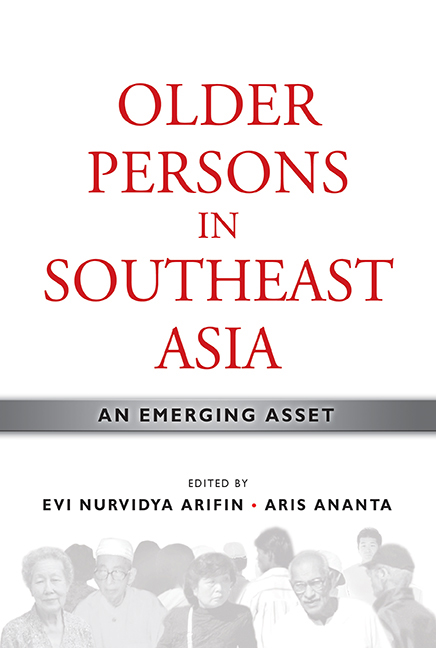Book contents
- Frontmatter
- Contents
- List of Tables
- List of Figures
- Foreword by Hal Hill
- Message from the Director
- Preface
- Contributors
- PART I INTRODUCTION
- 1 Older Persons in Southeast Asia: From Liability to Asset
- 2 Future Ageing in Southeast Asia: Demographic Trends, Human Capital, and Health Status
- PART II OLD-AGE INCOME SECURITY
- PART III EMPLOYMENT AND OTHER SOURCES OF FINANCIAL CONTRIBUTION
- PART IV AGEING, MIGRATION, AND DEVELOPMENT
- PART V ROLES OF GOVERNMENT AND CIVIL SOCIETY
- Index
1 - Older Persons in Southeast Asia: From Liability to Asset
from PART I - INTRODUCTION
Published online by Cambridge University Press: 21 October 2015
- Frontmatter
- Contents
- List of Tables
- List of Figures
- Foreword by Hal Hill
- Message from the Director
- Preface
- Contributors
- PART I INTRODUCTION
- 1 Older Persons in Southeast Asia: From Liability to Asset
- 2 Future Ageing in Southeast Asia: Demographic Trends, Human Capital, and Health Status
- PART II OLD-AGE INCOME SECURITY
- PART III EMPLOYMENT AND OTHER SOURCES OF FINANCIAL CONTRIBUTION
- PART IV AGEING, MIGRATION, AND DEVELOPMENT
- PART V ROLES OF GOVERNMENT AND CIVIL SOCIETY
- Index
Summary
Disappearing Filial Piety?
Ipan (not a real name), in his forties, was caught in a complex dilemma. He had an offer of a more promising job in Samarinda, the capital city of the province of East Kalimantan, Indonesia, than his job in Bandung, the capital city of the province of West Java. He had been living with his wife and two young children in Bandung, a four hour flight and two-hour drive to Samarinda. Ipan lived in an extended household with four generations, including Ipan' grandmother-in-law, 84, and mother-inlaw, 68. Ipan' wife ran a home industry and, therefore, could help her mother take care of the grandmother, and bring the children up on her own. Her mother, in turn, helped take care of her children (one aged five, and the other, two).
The dilemma was whether Ipan should move to Samarinda for a better income, together with his family, leaving his mother-in-law alone, or move to Samarinda on his own, permitting his wife and children to be with her maternal parents? Should they continue co-residing with his older “mothers” in Samarinda? His mother-in-law was reluctant to move as she wanted to spend her golden years in the house she used to live in and in the society where she used to belong. She was not brave enough to handle the required adjustments should she move to Samarinda, which is ethnically and sociologically different from Bandung. More importantly, she wanted to continue taking care of her octogenarian mother. Finally, Ipan decided to accept the job and move to Samarinda without his family for several months. Later on, he and his wife made a hard decision to leave the mother and grandmother in Bandung. An unmarried brother of Ipan' wife moved into the house to keep two older women company. Ipan and his family have changed the way of taking care of the older persons: now through a distant, more formal care.
Ipan is not from a poor family. Ipan and his wife are still able to finance and take care of their parents. His older mother and grandmother are not abandoned. With the availability of advanced technology in communication, particularly the capacity to send short message through a mobile phone, Ipan' wife managed to exchange news continuously with her mother and grandmother.
- Type
- Chapter
- Information
- Older Persons in Southeast AsiaAn Emerging Asset, pp. 3 - 46Publisher: ISEAS–Yusof Ishak InstitutePrint publication year: 2009



